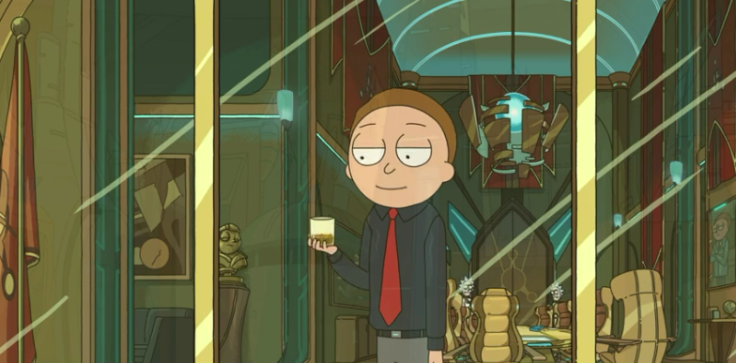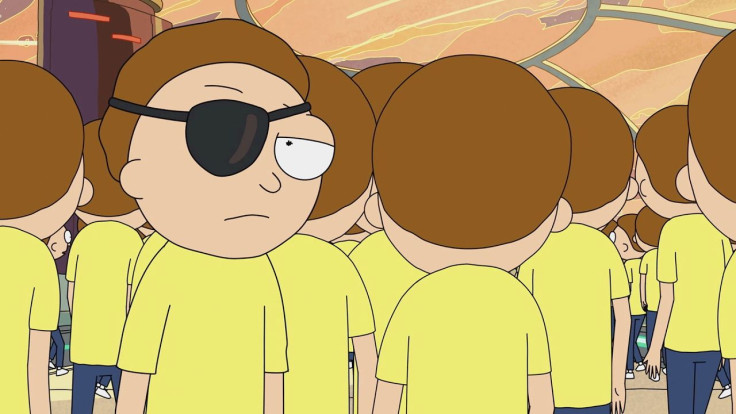After the astonishing political rise of Evil Morty in “The Ricklantis Mixup” — a bait-and-switch for the actual title, “Tales from the Citadel” — many people seem certain they know what’s going to happen next, propagating a fan theory purporting to explain Evil Morty’s motivation. According to this theory, Evil Morty is Rick’s original Morty, whom Rick abandoned to be with “our” Morty. Despite solid supporting evidence, it’s almost certainly wrong.
Evil Morty first appeared in Rick and Morty Season 1 episode, “Close Rick-counters of the Rick Kind,” masterminding a plot to murder multidimensional Ricks after stealing their experience and memories. Evil Morty’s efforts to pin the murders on Dimension C-137 Rick (the titular Rick of Rick and Morty) backfired and Evil Morty abandoned his scheme, slipping away without anyone suspecting him. In “The Ricklantis Mixup,” Evil Morty wins the Citadel of Ricks presidential election. By the episode’s end he’d purged his political opposition, empowered the oppressed Morty class and adopted the trappings of a fascist police state.
But does Morty’s rise to power have anything to do with our Rick and Morty, the duo who spent the episode ignoring Citadel politics and chasing mermaid puss in Atlantis? “That place will never have any bearing over our lives ever again,” Rick says. Dramatic irony dictates the opposite.
“‘Rick and Morty’ fan theory might have predicted this season’s big twist,” says Mashable. “This ‘Rick and Morty’ Fan Theory About Evil Morty Seems Very Likely,” writes Inverse. Both take as their central premise Evil Morty’s rise to power is not an end in itself, but part of Evil Morty’s master plan against Rick C-137, presumably in revenge for abandoning him, Rick’s original Morty.
This makes a certain sort of superficial sense. In “Close Rick-counters of the Rick Kind” Rick’s memories of Morty as a baby are briefly revealed, despite Rick only reappearing in the lives of the Smith family when Morty was a teenager, shortly before the series begins. Rick has fond memories of a different Morty, the fan theory contends, with some reason (though “back in our lives,” as Rick’s daughter Beth describes it, doesn’t seem to demand that Rick was never, ever around).
It’s a fan theory that might well be true if this were Westworld, or any other show that’s about season-spanning clockwork. But that’s not how Rick and Morty is written or its ideas conceived.
First, Rick and Morty writers intentionally thwart fan theories. And “Evil Morty’s motives are actually about our Rick, with whom he shares a backstory” is about as doctrinaire as fan theory can get.
“The fastest way to make sure your Rick & Morty fan theory is wrong is to tell me about it, because then I’ll make sure it never happens,” writer and producer Mike McMahan tweeted. “I can’t guarantee that I’ll have the sway to 100 percent keep it from happening, but I’ll try. I’ll try until I’m dead.”
Evil Morty’s secret background as Rick’s original Morty is precisely the kind of plotline the Rick and Morty writer’s room would first reject. And considering Evil Morty’s origin story with Rick has been discussed for years, it’s almost certainly been explicitly rejected as Evil Morty’s motive. Not because it’s not the best fit for the evidence, but because they don’t see the function of storytelling as fulfilling best-fit narratives.
Moreover, Evil Morty’s backstory wasn’t known by the writers in the first two seasons, undermining the idea that they’d planted hints in episodes to tee up the fan theory’s plot.
“We probably talked about Evil Morty in that writers’ room more than we actually spent working on episodes that aired,” Rick and Morty co-creator Dan Harmon told Comic Book Resources shortly before Season 2. “And I think the very wise decision that we made, after talking that much about Evil Morty, was that none of it was coming from a place of joy.”
“Or just inspiration. It was forced,” co-creator Justin Roiland said. “When we want to come back to something really cool, like Evil Morty, I want to make sure I know what’s his motivation, what’s his backstory, what’s going on. And it has to be inspired and it can’t be forced and it can’t be joyless.”
What could be more forced and joyless than the fan theory’s assertion that Evil Morty is doing everything as part of an elaborate revenge against Rick for a grudge that precedes the show? It’s the Rick and Morty equivalent of turning Martha and Thomas Wayne’s killer into The Joker.

Although the Evil Morty backstory is peddled as a near foregone conclusion, it’s dubious from a creative perspective. The assembled evidence is belied by the Rick and Morty writing process. When it comes to Rick and Morty, intricacy is often mistaken for forethought. But the writers didn’t plan this stuff out years in advance, carefully planting clues. Unlike fans focused on the complete fabric of the Rick and Morty universe, Rick and Morty’s writers are chasing the best stories episode-by-episode, looking for “joyful” narratives to tell, rather than nurturing just-so explanations for the validation of their most scrupulous viewers.



















